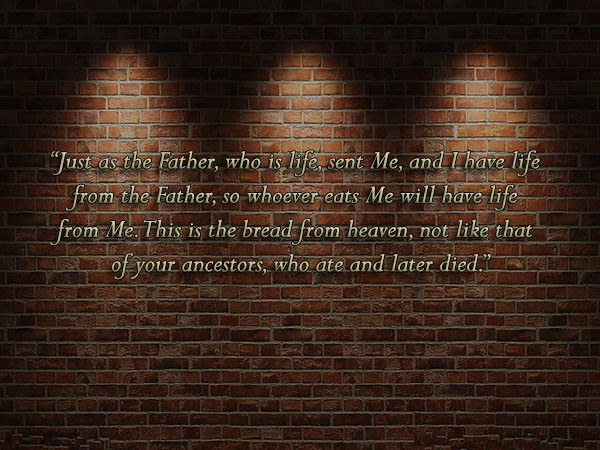Post Credit: Homiletic Pastoral Magazine
By
Abbreviations
LG: Lumen Gentium, Second Vatican Council Dogmatic Constitution on the Church
MR: Missale Romanum (Roman Missal) (2010)
SC: Sacrosanctum Concilium, Second Vatican Council Constitution on the Sacred Liturgy
Introduction
There is no debate that among those of the millennial generation, religious/sacramental marriages are in decline. Why are sociologists predicting that 25 percent of millennials will never marry, and that, currently, 25 percent of millennials between the ages of 25-34 cohabitate, instead of marrying?1 Furthermore, Mass attendance and charitable giving to the life and support of one’s parish among millennials is also down from previous generations. Why is this, and why do I have anything to say about it?
First of all, I graduated from high school in 2001 … I am the very definition of a millennial! I know and understand the millennial generation—my generation—not because I am a sociologist or statistician, but because I am a part of the millennial generation. Second, the two opening statements above are true for good reasons:
- The economic recession of 2007/2008 greatly impacted the earliest demographic of the millennial generation, and our career advancement, as well as our earnings potential. In addition, the incredible cost of college education and incurred debt has become prohibitive for young couples who wish to start a new life together when such debt can negatively affect one’s approval for a home mortgage.
- Twenty-four percent of millennials grew up with divorced parents and 11 percent of millennials grew up in a single-parent household, not knowing (at least, well) their other parent. Why would our millennial generation commit to marriage, when we fail to see, in such a huge demographic of our parent’s generation, that marriage has a favorable outcome?
- Religious practice among millennials, specifically Catholic millennials, is split. And this is a slight anomaly among millennials, because millennials, generally speaking, are very much united since the philosophy of “inclusivism” is probably the strongest value held by them. Thus, this particular point needs further exploration.
Religious practice among millennials varies. There are those who grew up in the enthusiastic embrace of Pope St. John Paul II, and who also loved Pope Benedict XVI. These millennials were greatly influenced by World Youth Day, and other such events, and papal teachings. On the other hand, there are those who grew up in a more secular or nontraditional home because their parents had lost the faith during the turbulent days of the 1960s and 1970s, or were divorced, or single-parent families. These millennials are more taken with contemporary trends and sociopolitical movements, which are largely at odds with traditional Catholic teachings on faith and morals. This is the “spiritual, not religious” crowd. Of course, there are also millennials who are just rebellious. Still, there are those who are faithful, church-attending Catholics, but marked with a clear interest characteristic of millennials, that is, they favor “change” and/or “inclusivism.” Specifically, they seek change regarding the Church’s stance on gay marriage, contraception, sex outside of marriage, and similar social issues. This “change” crowd feels that “inclusivity” is more important than centuries old understandings of marriage and family. Now, these characterizations are broad and general. But the millennial generation is all about being unique so, most likely, a millennial reading about these generalizations will find fault with them. Nevertheless, for all intents and purposes, they do characterize, in broad terms, the millennial Catholic.
Yet, we millennials are not a “lost” generation to the faith. Among millennials, there are certain characteristic marks that intrinsically lend themselves to religion. We have a great thirst for the mysterious and supernatural (will there be yet another movie or TV series about wizards, vampires, or the supernatural?). We are generally liberal, and thus express a great interest in social justice and service to the poor, marginalized, and disenfranchised. We millennials are also upbeat and positive. We are self-confident, sometimes too much so; and we are respectful to our elders. Lastly, we see Jesus as “inclusive,” and inclusivity is our banner. The free gift of salvation is offered to all people of faith, hope, and love in God. Marriage as a sacramental sign of that inclusive offering of salvation by Christ is a point of emphasis that must be developed and proclaimed among us millennials. Any creative and insightful pastor/parish priest should be able to “tap” into these traits and give us millennials what we desire most: a sense of belonging. When we, as millennials, feel we can take some ownership, and are welcomed into a community such as a parish, that is a positive and inclusive message, and we will become a lifelong asset.
But for one issue, millennials need not become another lost generation to the Catholic Church. In the past, if a person was less active in the Church during adolescence or young adulthood, after marrying and having children, he or she would return, once again attending Mass faithfully, and participating in the parish community. Yet, with millennials (of course, we have to be different), this is not the trend. Why? Because what the Church teaches is wrong, bad, or exclusionary? Absolutely not. The problem is the oldest and simplest: a lack of understanding. We do not understand the message of the Church regarding marriage. This is probably due to any number of reasons, some of which include our experience of an unsuccessful marriage, or our experience of family life in our own upbringing. Poor catechesis during childhood is another possible reason (let’s make a collage!); or the influence of the secular media; or social issues “hitting home” with family or friends; or apparent, but not necessarily conflicting, values such as faith in the teachings of Jesus Christ, and inclusivism.
Consequently, there are two things that are greatly needed:
- A clear, positive, and inclusive expression of the Church’s understanding of marriage as a vocation and service within the Church; and,
- Some practical/pragmatic aids to preparing for, and living out, a successful marriage.
With so many failed marriages as our model and general experience, where are we to turn, to learn how to make a marriage work? This one critical question offers a huge opportunity to the Church to provide a much-needed and wanted answer to our generation.
Yet, before exploring “what marriage is” and providing helpful guidelines—which is all good—what I want to express to my generation first of all, is why getting married is even relevant today. Do you want to feel fulfilled? Do you want to become the best version of yourself? Do you want to be truly happy? Or, do you want to live on your own and feel lonely?
The first issue is that staying single for one’s whole life is not necessarily a key to happiness. Love is relational: it is not something that can ever fulfill us unless it is relational and reciprocated. Thus, when I love someone so much that my day isn’t complete without being with that person, and I am not truly, fully myself without the complement of his or her presence in my life, I need to concretize that relationship in order to become the best version of myself. This can only come to its highest fruition if I commit myself to the other person in an exclusive, permanent relationship of unitive love. This is called marriage. It is from such a relationship that I draw strength, security, and the love that makes me grow into my best self.
A second aspect is what about the person who is “free,” and thus capable of just having sex without commitment? Isn’t that great? Only when one has the courage to truly commit, can life truly become exciting. Many sexual partners may be fun for a while, but ultimately, it just leaves you feeling empty, because real love, reciprocal love, has never fully occurred—sexual pleasure, sure. But, nothing real and lasting has taken place, nothing that can actually fulfill our need in life for love, meaning, and purpose. And, after a while, sexual pleasure can’t really provide for all that we would want to get out of life. Why? Because, if we live only for pleasure, we live selfishly, and by living selfishly, we will never feel fully happy or fulfilled. It is only when we love someone unconditionally, and someone else loves us unconditionally, that our life, meaning, and purpose take on endless horizons of joy. As paradoxical as it may seem, it is only when we sacrifice for another, who is likewise sacrificing for us, that we are truly conscious of the power of love in our life.
A third point to consider is that in a generation that is very accepting of so many alternative family structures, but is greatly impacted by divorce and single-parent upbringing, we are not “boxed-in” by conventional structures of family and marriage. This isn’t altogether a “bad” thing, because often, these days, both husband and wife need to earn a living. That said, cohabitation, which is so common in our generation, is not truly a “good” option. Marriage, when it is lived as it is supposed to be lived, as a vocation and service, is a concrete, loving commitment between two people, in which the emotional, economic, and psychological welfare of both people are accounted for. Cohabitation is not a commitment. It is “playing house,” an arrangement in which, in the end, either party can pull out at any time. Without making a real commitment to one another by uniting in marriage, we cannot truly commit our trust for emotional, psychological, and economic well-being in the other person.
A fourth point is that as a generation so well versed in divorce, single-parent families, etc., can you really deny that stability is a “value” that every child deserves? Marriage, as a service, provides the structures for children to be raised in a stable environment. Sure, if the marriage between two people wasn’t well discerned, then it could become a nightmare for the spouses, as well as for the children. That’s why the Church is so relevant, because with the help of God and the Church community, nourished and strengthened by the faith, not only will God and the Church help you find the right person, but it will give you the guidelines to help you live that marriage successfully with the right person.
The last point to be made is that God is Love and a union of that Love in three Persons, the Holy Trinity. True love needs God, and needs his Church—the instrument God wielding to bring about the eternal well-being of us all.
These are all messages that will contribute to a rise in marriages in our millennial generation:
- Promoting marriage as a positive experience by offering guidelines to a successful marriage.
- Emphasizing that marriage is supposed to express love and care for children, for the poor, and for the elderly.
- Adding that marriage can be embraced even before each partner is professionally and economically established—in fact, marriage can serve as a pillar of support for spouses, by assisting and encouraging them in their personal and professional development.
Together with the inclusive message of salvation of Jesus Christ, the support of the Church, and the power of faith for the success of one’s marriage, we will see a rise in Catholic millennial marriages—and, subsequently, a greater participation of the millennial generation in our parishes.











